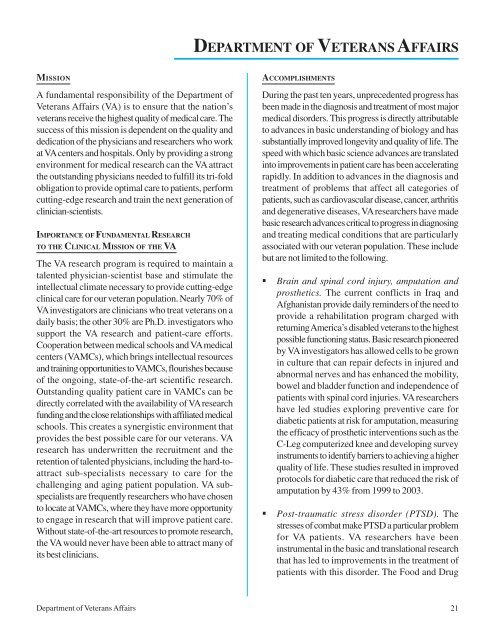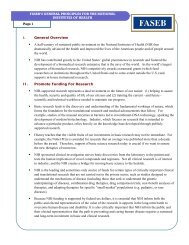national institutes of health - FASEB
national institutes of health - FASEB
national institutes of health - FASEB
You also want an ePaper? Increase the reach of your titles
YUMPU automatically turns print PDFs into web optimized ePapers that Google loves.
DEPARTMENT OF VETERANS AFFAIRS<br />
MISSION<br />
A fundamental responsibility <strong>of</strong> the Department <strong>of</strong><br />
Veterans Affairs (VA) is to ensure that the nation’s<br />
veterans receive the highest quality <strong>of</strong> medical care. The<br />
success <strong>of</strong> this mission is dependent on the quality and<br />
dedication <strong>of</strong> the physicians and researchers who work<br />
at VA centers and hospitals. Only by providing a strong<br />
environment for medical research can the VA attract<br />
the outstanding physicians needed to fulfill its tri-fold<br />
obligation to provide optimal care to patients, perform<br />
cutting-edge research and train the next generation <strong>of</strong><br />
clinician-scientists.<br />
IMPORTANCE OF FUNDAMENTAL RESEARCH<br />
TO THE CLINICAL MISSION OF THE VA<br />
The VA research program is required to maintain a<br />
talented physician-scientist base and stimulate the<br />
intellectual climate necessary to provide cutting-edge<br />
clinical care for our veteran population. Nearly 70% <strong>of</strong><br />
VA investigators are clinicians who treat veterans on a<br />
daily basis; the other 30% are Ph.D. investigators who<br />
support the VA research and patient-care efforts.<br />
Cooperation between medical schools and VA medical<br />
centers (VAMCs), which brings intellectual resources<br />
and training opportunities to VAMCs, flourishes because<br />
<strong>of</strong> the ongoing, state-<strong>of</strong>-the-art scientific research.<br />
Outstanding quality patient care in VAMCs can be<br />
directly correlated with the availability <strong>of</strong> VA research<br />
funding and the close relationships with affiliated medical<br />
schools. This creates a synergistic environment that<br />
provides the best possible care for our veterans. VA<br />
research has underwritten the recruitment and the<br />
retention <strong>of</strong> talented physicians, including the hard-toattract<br />
sub-specialists necessary to care for the<br />
challenging and aging patient population. VA subspecialists<br />
are frequently researchers who have chosen<br />
to locate at VAMCs, where they have more opportunity<br />
to engage in research that will improve patient care.<br />
Without state-<strong>of</strong>-the-art resources to promote research,<br />
the VA would never have been able to attract many <strong>of</strong><br />
its best clinicians.<br />
ACCOMPLISHMENTS<br />
During the past ten years, unprecedented progress has<br />
been made in the diagnosis and treatment <strong>of</strong> most major<br />
medical disorders. This progress is directly attributable<br />
to advances in basic understanding <strong>of</strong> biology and has<br />
substantially improved longevity and quality <strong>of</strong> life. The<br />
speed with which basic science advances are translated<br />
into improvements in patient care has been accelerating<br />
rapidly. In addition to advances in the diagnosis and<br />
treatment <strong>of</strong> problems that affect all categories <strong>of</strong><br />
patients, such as cardiovascular disease, cancer, arthritis<br />
and degenerative diseases, VA researchers have made<br />
basic research advances critical to progress in diagnosing<br />
and treating medical conditions that are particularly<br />
associated with our veteran population. These include<br />
but are not limited to the following.<br />
<br />
<br />
Brain and spinal cord injury, amputation and<br />
prosthetics. The current conflicts in Iraq and<br />
Afghanistan provide daily reminders <strong>of</strong> the need to<br />
provide a rehabilitation program charged with<br />
returning America’s disabled veterans to the highest<br />
possible functioning status. Basic research pioneered<br />
by VA investigators has allowed cells to be grown<br />
in culture that can repair defects in injured and<br />
abnormal nerves and has enhanced the mobility,<br />
bowel and bladder function and independence <strong>of</strong><br />
patients with spinal cord injuries. VA researchers<br />
have led studies exploring preventive care for<br />
diabetic patients at risk for amputation, measuring<br />
the efficacy <strong>of</strong> prosthetic interventions such as the<br />
C-Leg computerized knee and developing survey<br />
instruments to identify barriers to achieving a higher<br />
quality <strong>of</strong> life. These studies resulted in improved<br />
protocols for diabetic care that reduced the risk <strong>of</strong><br />
amputation by 43% from 1999 to 2003.<br />
Post-traumatic stress disorder (PTSD). The<br />
stresses <strong>of</strong> combat make PTSD a particular problem<br />
for VA patients. VA researchers have been<br />
instrumental in the basic and translational research<br />
that has led to improvements in the treatment <strong>of</strong><br />
patients with this disorder. The Food and Drug<br />
Consensus Department Conference <strong>of</strong> Veterans Affairs Report 21





